 When I said that “god was my first abuser,” at our regular meeting of Parents of Sexually Abused Children, no one sucked in their breath or exhibited shock. A tough group, no one even blinked an eye.
When I said that “god was my first abuser,” at our regular meeting of Parents of Sexually Abused Children, no one sucked in their breath or exhibited shock. A tough group, no one even blinked an eye.
That week’s topic, “Grooming” was assigned by Aidan, our lead Social Worker who, while she listened to us, liked to re-shape lifeless paper clips into unconventional characters that she’d stand up on an enormous art canvas she’d been creating for years and years.
I shared with my group that, in Grade 1, when I learned that god ordered his own kid, a boy, to save the world, I instantly thought of Gordie, my teenaged brother. As Sister Brebeuf pointed to a bleeding figure nailed to a crucifix on our classroom wall, tears of blood running down his face, I saw Gordie.
My Dad followed god’s example. Dad knew good and well that Mother disliked Gordie, that my step-brother was used as a slave at home, slapped hard for innocent mistakes and shamed for his chronic skin condition. Dad saw no reason to protect his son, either.
Escape was Dad’s impulse, not resolution. His career as a traveling salesman nailed Gordie to his cross.
With the group listening, I reviewed my earliest memories of questioning a god who’d ask his boy to save the world instead of doing it himself. Why would any god want to rescue the earth, if he wouldn’t protect his own kid from harm?
“In my humorless home,” said Marta, “we were coached to pray. Prayer, we were told, pleased a male deity who loved children. Our sacrifice, especially of daily pleasures, could be used as a kind of exchange, a currency that would, if we prayed hard enough, rescue evil doers from hell.”
“This is where things pretzel for me,” said Ruth, “Isn’t in unnatural to focus on rescuing the very people who’ve hurt you? Why twist yourself into rescue agents for the bad guys?”
I loved how a simple word, grooming, could, step by step, travel so far. Holding onto my warm teacup, my mind slipped back into the bedroom I shared with my three sisters decades ago. I was eight.
When Dad was in town, he’d position his straight-backed chair, so we could all see him before he read bedtime stories aloud to us. While Irene fell asleep in minutes, Maureen and I would remain alert, two little sponges absorbing toxicity we had no way of filtering. Dad selected stories of the saints, mutilated martyrs, loyal to god even unto grisly death. The tales described, in minute detail, what the faithful were willing to suffer for god’s approval. Some of the tormented were hung upside down or immersed face first into boiling oil. Others were released into the Roman Colosseum, where thousands cheered while these loyal saints were torn limb from limb by crazed lions, wild animals starved so there’d be no chance of befriending their lunch.
As I lay in the bed I shared with Maureen and listened, my hands pressed to my face, I’d review the menu of tortures and consider the ones I might one day endure. Dad described the torture of saints being roasted alive strapped to sizzling iron chairs, their eyes poked out with hot pokers. The lucky ones got rapid death by beheading or quick drowning. We’d end our story time with our usual prayer, “Dear god, I love you. Please teach me to love you more and more every day, Amen.”
I’d scrunch up and pray to endure any persecution for dear god. One night, I made my decision. I opted to get it over with, to die quickly when my time came, rather than squeal for hours in unspeakable terror. Slowly, I began to dislike my cowering, shivering, comfort-seeking self. “You’ll jump in to be tortured when its time,” I reassured myself, “You’ll die fast, and god will be pleased.
One day, I watched Dad select a capon from the chicken coop and slaughter it for dinner. Its headless body ran around the dirt floor for several seconds before it fell, its face still on the chopping block. If I opted for a martyr’s death by beheading, would I also reel about with blood pouring from the hole where my head had been?
I began splashing scalding hot water from the tap onto my face to evaluate my tolerance of heat. I held my urine inside my body as a secret gift of personal pain to please god. Still, the thought of torture made my skin crawl. I bargained for survival.
“Daddy, how long would I boil in hot oil before I’d die?
“About three minutes, I’d guess, Eleanor,”
“And drown?”
“A good two minutes of struggle.”
“Buried alive?” I asked, my hands sweating.
“A day at most.”
I weighed my options, considering the duration of each torture. Even sticking my toe in too-hot bath water scared me, but still, could lingering in a dark box for a day be worse than three minutes of being cooked?
“Daddy,” I said. “If there’s a persecution, I could pray in secret. That way I could live. I could run around serving god in other ways.” I waited in silence.
“Which do you think would please god more?” Dad replied, adding that the saints willingly sacrificed themselves. “They suffered horribly. So let’s not complain about our small irritations and minor tribulations around here. Instead, let’s honor god’s magnificent love for us.
After Dad said goodnight, Maureen and I’d grapple with our confusion about a relationship that combined abject obedience, love, and possible torture. “Let’s practice,” my sister would grab my arm. “A little bit of salt, a little bit of pepper,” she’d say, pretending to season my flesh before biting into it. “Test how long you can take the pain, for god.”
As for me, I’d already stopped being who I was. I only wanted to please the power I feared.
***
Long after she’d retired for a richly deserved rest, I saw Aidan’s wall-sized installation in the reception area of the Social Service Agency where she’d lived her magnificent profession for three decades. I looked up to thousands of silver paper clips lying flat in the congested center of the canvas. Emerging from this pile though, radiating outward, hundreds of upright paper clip people, legs outstretched, made their way to far more spacious ground. Each one stood up tall, individually.
Grooming, I learned, can be re-shaped.
Eleanor Cowan is author of “A History of a Pedophile’s Wife,” which is available on Amazon.com. Visit her at eleanorcowan.ca




































 12 Reasons to forgive yourself for falling for the sociopath
12 Reasons to forgive yourself for falling for the sociopath
Hafren
I have come across a lot of people who have been seriously damaged by religious teachings. My ex, a narcissist, pointed out that historically, religion is a way for the rich and powerful to subdue the uneducated masses with tales of hell fire and damnation.
I myself have no religion but I endorse what the Dalai Lama teaches and I quote, “kindness is my religion”. Does anyone really need more?
regretfullymine
its the legalistic, conservative teachings, that I think cause the most harm to women. the ‘submissive wife’ teachings. it makes you question the ‘goodness, mercies, lovingkindness’ that God is supposed to show. I had to get away from this kind of teaching. I still don’t trust God as I should.
Sunnygal
the book ‘Integrity of a father’ by reeni fenholt talks against DV from a Christian perspective.
Abigail
Pastor Jeff Crippen in Tillamook Oregon gets it. He wrote A Cry for Justice: How the Evil of Domestic Abuse Hides in Your Church.
Unfortunately, he reports his own church has been somewhat shunned by peers. He speaks out anyway.
There’s A Cry for Justice website and his sermons are available online too.
He and his team cite Lundy Bancroft’s Why Does He Do That? Inside the Minds of Angry and Controlling Men, Dr. George Simon’s works, and other great sources.
All Christian based.
Like Christ said, “Many will come to the gates…and only a few will pass through.”
Sunnygal
I got alot from Reeni Fenholt’s book. I heard pastor jack hayford say if women were treated like they were supposed to be treated, there would be no need for the Equal Rights Amendment.
Stargazer
I’m very grateful that of all the abuse I suffered at the hands of parental figures, I never had to deal with religious abuse. Once my mother divorced my father, who insisted we go to synagogue every week, when I was 7, there was no talk of religion or God, nor any visits to churches or synagogues. My mother and father were Jewish, but my stepfather was a non-practicing Baptist, my mother a non-practicing Jew. Without my father’s influence in my life after the age of 7, I was left to develop my own idea of spirituality, which has been a lifelong undertaking. I see how many people have been damaged by religious institutions from early on in their lives, and I’m glad that wasn’t a part of my upbringing, though I used to wish it were so I could fit into the mainstream better.